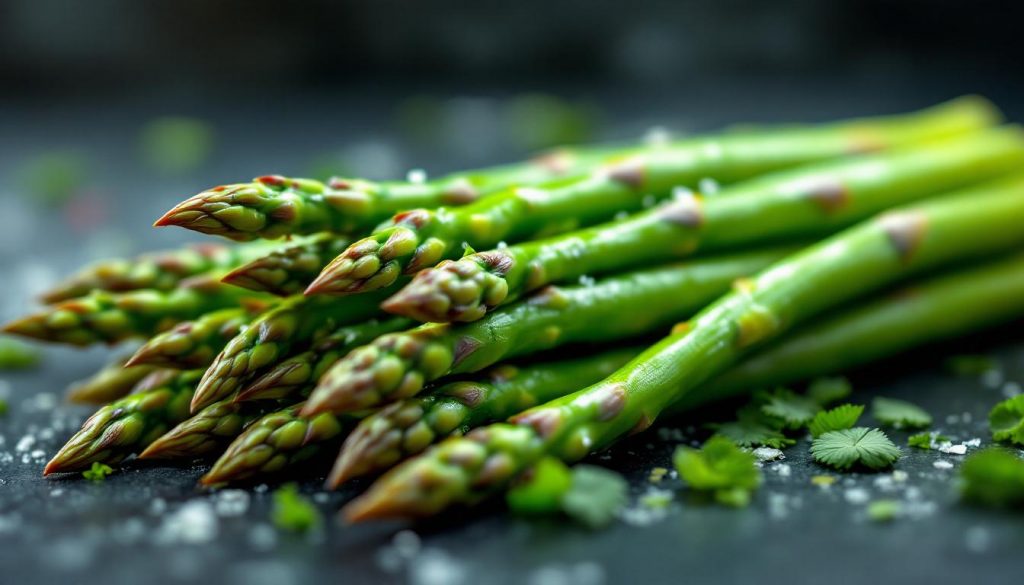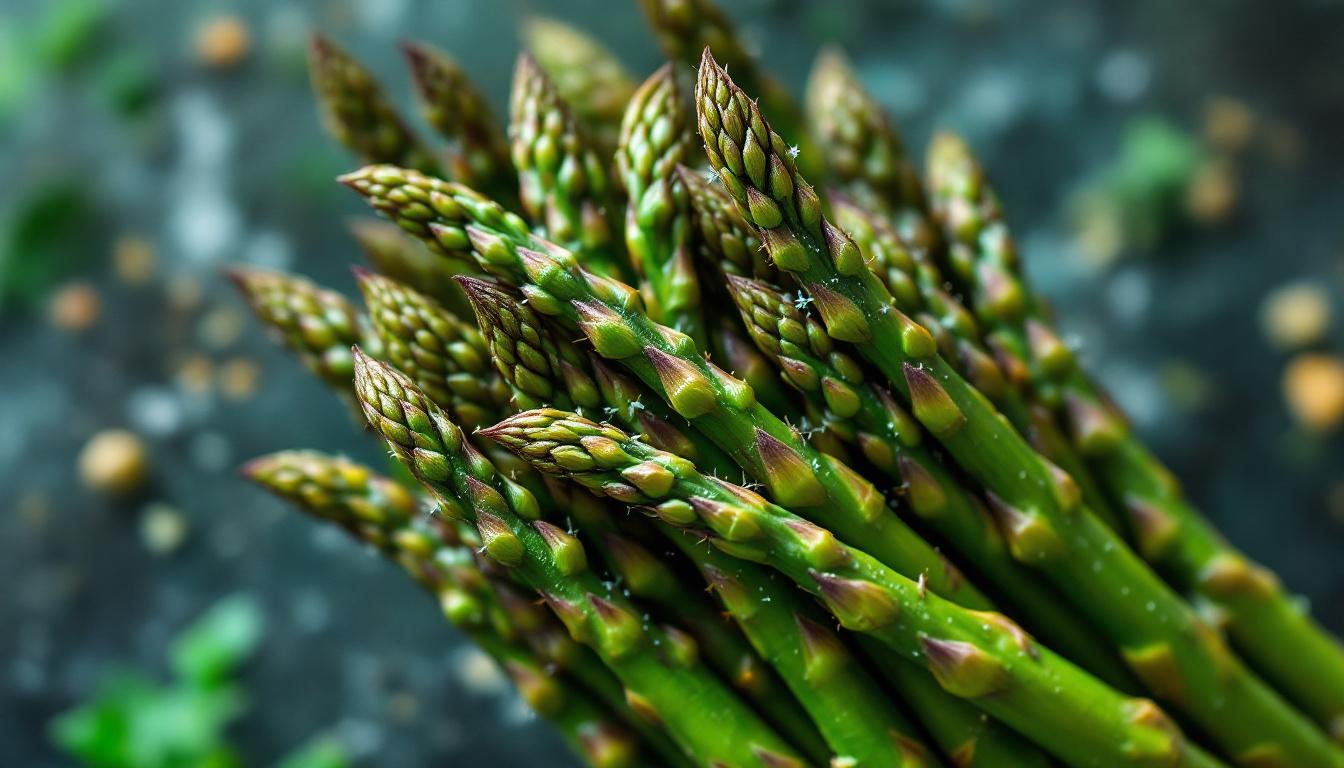Your Friendly Guide to Composting Asparagus at Home
If you’re wondering, “can asparagus go in compost?”, the answer is yes. Asparagus, like many other veggie scraps, breaks down well in a home compost pile or compost tumbler.
Composting turns kitchen leftovers into healthy soil, helping your garden and the planet at the same time.
By composting asparagus, you’re recycling waste and adding nutrients back to your garden soil instead of sending them to landfill.
In this guide, you’ll find out just how easy it is to compost asparagus, whether you use a backyard pile, a compost tumbler, or even vermicomposting with worms.
This post will walk you through what composting is, why it matters, and how to make eco-friendly choices right from your kitchen.
Key takeaways:
- Asparagus can be safely added to compost and compost tumblers.
- Composting food scraps helps reduce waste and supports healthy soil.
- Vermicomposting is a worm-powered way to recycle even more.
- Home composting is simple, rewarding, and great for the environment.
Can You Compost Asparagus? Quick Answers and Science
 Photo by Viktoria Slowikowska
Photo by Viktoria Slowikowska
Curious if those woody asparagus ends or limp stalks can join your compost pile?
Good news: the answer to “can asparagus go in compost?” is a happy yes. Asparagus—like most veggie scraps—breaks down into rich compost, giving your kitchen leftovers a second life instead of ending up in a landfill.
Composting asparagus helps feed your soil, cuts household waste, and boosts your eco-friendly routine all in one go.
The Science Behind Composting Asparagus
Let’s keep things simple but smart. Composting is the process of turning food scraps and plant matter into fertile, earthy material for your garden.
When you toss asparagus scraps into your pile, they break down with the help of tiny organisms like bacteria, fungi, and worms.
Over weeks or months, these helpers transform your asparagus into dark, crumbly compost.
Here’s why asparagus is a good fit:
- High in Water and Fiber: Asparagus stalks and peels add moisture and carbon-rich fiber to your pile.
- Breaks Down Easily: Cut or chop them up—smaller pieces turn to compost faster, making your composting process quicker and smoother. You can learn more about why size matters for decay at “Composting 101”.
- No Toxic Compounds: Asparagus isn’t treated with heavy chemicals and doesn’t carry compounds that could harm compost microbes.
Will Asparagus Work in Every Compost Setup?
Absolutely—whether you’re using a backyard pile, a sealed compost tumbler, or even dabbling in vermicomposting with worms, asparagus scraps can be included.
- Compost Pile or Bin: Toss stalks and ends right in. Mix with “browns” like dry leaves or cardboard for best results.
- Compost Tumbler: Works great for asparagus scraps, especially when chopped. Tumblers speed up the process by stirring and trapping heat.
- Vermicomposting: Worms love soft, chopped asparagus scraps. Just add in moderation—too much wet material can make things soggy.
If you’re just beginning, see how easy it is to build habits in the garden with these friendly home composting starter tips.
Tips for Composting Asparagus for Best Results
For compost that breaks down quickly and smells fresh, try these quick tips:
- Chop or Snap: Cut asparagus into small chunks so microbes and worms can break them down faster.
- Balance With Browns: Pair those green asparagus scraps with dry leaves, shredded paper, or cardboard to keep your compost balanced and airy.
- Avoid Moldy Clumps: Spread stalks in the pile to prevent slimy or moldy spots.
- Turn and Aerate: Stir your pile (or spin your tumbler) regularly to help everything decompose evenly.
If you add kitchen scraps often, remember that balance is key. Compost tumblers make it simple to mix in new waste—it’s as easy as giving it a spin!
For more ideas on good composting practices, take a look at these “how to compost at home” suggestions from the EPA.
Why Composting Asparagus Matters
So, why should you bother?
Composting doesn’t just make great soil—it helps the planet, too. Each time you put asparagus (and other veggie scraps) into the compost, you’re:
- Cutting down on trash headed to landfill
- Saving resources and money on store-bought fertilizer
- Feeding your plants with natural, chemical-free nutrients
Every little step counts. Want more ideas for sustainable actions? Join Compost Charm’s Don’t Toss It Campaign and pick up new ways to compost what you might have thrown out.
Key Takeaways
If you’re eager for a quick answer or a refresher, here are the top points to remember:
- Yes, asparagus scraps can go in compost, including piles, bins, tumblers, and vermicomposting setups.
- Chopping asparagus speeds up decomposition.
- Mix asparagus (“greens”) with “browns” like dry leaves for a balanced compost blend.
- Composting asparagus helps your garden and the environment.
- Try different composting methods to see which one fits your home and routine.
Now you know the science and the simple steps.
Composting asparagus is another tiny habit with a big impact on both your soil and your sustainability goals.

The Basics of Composting: Making the Most of Asparagus and More
If you want to know, “can asparagus go in compost?” the clear answer is yes—those asparagus scraps aren’t just safe to compost, they’re actually a valuable ingredient!
Composting at home brings together kitchen leftovers and yard waste, like asparagus stems and dried leaves, to create something amazing for your garden.
It’s a simple habit that anybody can start, whether you use a compost pile, a tumbler, or even try vermicomposting with worms.
How Does Composting Work?
 Photo by Greta Hoffman
Photo by Greta Hoffman
Think of composting as nature’s slow-cooker. You mix together two main types of materials:
- Greens: moist, fresh things like asparagus stalks, veggie peels, fruit scraps, and even fresh grass clippings.
- Browns: dry, woody things, such as autumn leaves, cardboard, paper, and small sticks.
For compost to break down quickly and without smell, it needs the right balance of these. Greens provide nitrogen (think “quick energy”), while browns are carbon-rich (like “sturdy building blocks”).
Microbes—tiny helpers you can’t see—feed on these materials and break them down into rich, crumbly compost.
Asparagus fits squarely in the “green” category, so it supplies the fuel for those microbes to do their work.
Adding asparagus to the pile is a lot like adding kindling to a campfire—useful, but always best balanced with a few logs (the browns) for an even, steady burn.
If you want even more detail on how composting works, here’s a straightforward guide on the process at Composting 101.
For those who love options, learning about the different kinds of composting methods, from basic piles to high-speed tumblers and worm bins, can help you pick what suits your space and lifestyle.
See what fits your routine with these 6 effective composting methods.
Why Composting Asparagus Makes Sense
Every time you toss asparagus scraps into your compost, you’re doing more than just cleaning out the fridge.
You’re keeping waste out of the landfill, where it would otherwise sit, rot, and release methane—a greenhouse gas that’s rough on the planet. Instead, composting recycles those bits into something your garden will love: homemade, nutrient-dense soil.
Here’s why composting asparagus is a win-win:
- Less landfill waste: Food scraps turn into garden gold instead of piling up in trash heaps.
- Nutrient boost for your garden: Compost made with asparagus feeds your soil, helping vegetables, flowers, and plants grow strong and healthy.
- Supports home sustainability: Small choices like composting add up. Each kitchen scrap makes your home a little more eco-friendly.
- Saves on store-bought fertiliser: Homemade compost is free and chemical-free.
Backyard gardeners and eco-conscious families love that this cycle turns yesterday’s dinner prep into tomorrow’s lush garden.
If you’re ever unsure if a kitchen item belongs in the pile, remember that almost all veggie scraps—including asparagus—are safe bets.
For more details on composting asparagus specifically, check out “Can I put asparagus in my compost bin?” at CanICompostIt.com.
If you want guidance on getting started, find easy, step-by-step advice in these tips for starting composting at home.
Key takeaways:
- Composting needs a mix of “green” (wet/fresh) and “brown” (dry/woody) materials for best results.
- Asparagus is a green, high in moisture and nutrients—perfect for your compost or compost tumbler.
- Composting asparagus keeps waste out of landfill, saves money, and grows healthier plants.
- Home composting is a simple step toward greener living—and it’s never too late to start.
Tips for Composting Asparagus Successfully
Ready to compost asparagus with confidence? If you’re searching for solid advice about how to compost asparagus and keep your bin thriving, you’re in the right place.
Asparagus might seem a little fibrous or tough, but it’s actually a great addition to your compost or even your vermicomposting system when you follow a few practical steps.
With the right know-how, you can make sure those woody stalks and leftover pieces break down smoothly, helping your garden grow stronger every season.
Chop Asparagus Into Smaller Pieces
 Photo by SHVETS production
Photo by SHVETS production
One top tip, especially if you’ve ever wondered, “can asparagus go in compost?” is to cut the stalks into short sections before you toss them in.
Asparagus is stringy and can take longer to break down if left whole. Chopping it up makes life easier for microbes, worms, and even your compost tumbler.
- Use kitchen scissors or a knife to trim asparagus into pieces about 2-3 cm long.
- Shorter pieces mean faster compost and less chance of slimy clumps.
- Good chopping habits help your greens break down at the same rate as your browns.
You’ll find this tip is true for most veggie scraps. For a deep-dive on the science behind why smaller is better, see this guide from Composting 101.
Balance Greens and Browns for Happy Compost
Asparagus acts as a green material in your compost, which means it’s packed with moisture and nitrogen.
Too many greens together can make your pile wet or smelly.
Pair your asparagus scraps with an equal or larger amount of browns, like shredded paper, dry leaves, or cardboard.
- Aim for about 2 parts brown for every 1 part green.
- Layering helps airflow, prevents compaction, and speeds up composting.
- Browns absorb extra moisture, balancing out those juicy stalks.
If you’re new to layering materials or keeping things balanced, these composting calendar tips will help you track and adjust as needed through the year.
Stir or Turn Your Compost Regularly
Oxygen is the secret ingredient to fast, healthy compost.
Every pile (or compost tumbler) needs to be mixed often so the asparagus scraps don’t settle and get slimy.
Stirring spreads heat, moves fresh scraps to the middle, and keeps everything breaking down.
- Turn your compost tumbler or stir your pile every week if you can.
- Mix new asparagus pieces in rather than just piling them on top.
- Don’t over-pack—fluff helps air reach every bit of the pile.
This tip matters even more if you’re composting indoors or using a closed bin where airflow is limited.
Composting Asparagus in a Tumbler or With Worms (Vermicomposting)
Wondering if “can asparagus go in compost” applies to all composters? Yes! Compost tumblers and worm bins love those asparagus bits, as long as you prep them right.
Worms in a vermicomposting system enjoy soft pieces mixed with bedding, but avoid dumping in huge amounts at once.
- In a tumbler, add chopped asparagus with lots of browns and spin often.
- In a worm bin, mix stalks with bedding (like newspaper or straw) so it doesn’t go soggy.
- Don’t overload—balance out asparagus with other scraps for steady breakdown.
If you’re considering vermicomposting but don’t know where to start, find step-by-step guidance with this resource on starting composting at home.
Avoid Composting Diseased Asparagus or Heavy Seasonings
Healthy asparagus scraps are great, but avoid adding pieces that look moldy or are covered in butter, oil, or heavy salt.
These can slow decay, attract pests, or upset the natural balance of your pile.
- Stick to raw or lightly cooked asparagus.
- Remove any big clumps of butter, oil, or dressing first.
- Check for signs of fungal disease before composting garden waste.
If you’re looking for more detailed guidance on what can (or can’t) go in your compost, sites like Can You Compost Asparagus? answer specific questions and troubleshoot common concerns.

Key Takeaways for Composting Asparagus
Here’s a quick summary so you can get composting fast:
- Chop asparagus into small pieces for quicker breakdown.
- Mix with plenty of browns like shredded paper or dry leaves.
- Turn or stir your compost pile (or tumbler) often.
- Asparagus scraps work in regular compost, compost tumblers, and vermicomposting bins.
- Avoid adding moldy or oily asparagus.
- A balanced compost bin smells sweet, breaks down quickly, and feeds your garden for free!
Happy composting! If you have more questions or need tailored tips, Compost Charm’s friendly bot can help—check out the Ask A Question tool for instant answers on composting at home.
Summary and Key Takeaways
Let’s wrap up what we’ve learned about the question, “can asparagus go in compost?” Asparagus scraps make a cheerful addition to compost piles, tumblers, and even worm bins (vermicomposting).
Whether you’re just starting out or already knee-deep in kitchen scraps, putting asparagus into your compost brings useful nutrients back to your garden.
It also helps reduce waste and keeps things simple, green, and earth-friendly.
Quick Answer: Can Asparagus Go in Compost?
Absolutely, yes! Toss asparagus stalks, ends, and trimmings right into your compost.
This works for most home setups, whether you have a simple heap, a sealed compost tumbler, or a bustling worm bin filled with friendly red wigglers.
Chop up the pieces for speedier breakdown and always balance out those “greens” with plenty of “browns” for happy, sweet-smelling compost.
Key Takeaways for Composting Asparagus
To make things extra easy, here’s a list of the most important lessons from this article:
- Asparagus scraps are safe for composting. Add them to garden piles, compost tumblers, or vermicomposting bins without worry.
- Chop asparagus for quick breakdown. Smaller pieces decompose much faster, especially in a tumbler or with worms.
- Balance your greens and browns. Pair juicy asparagus with dry leaves, paper, or straw for a well-aerated, healthy mix.
- Turn your compost often. Regular mixing gives your pile fresh air and helps everything, including asparagus, break down smoothly.
- Skip moldy or oily asparagus. Only compost healthy, raw, or lightly cooked stalks and ends for best results.
- Composting asparagus supports sustainability. Each stalk kept out of landfill means more nutrients for your garden and a lighter footprint on the earth.
Why Home Composting Matters
Composting at home does double duty: it cuts down landfill waste and gives you rich, natural fertilizer for free.
It’s as easy as saving kitchen scraps and yard waste, then letting time (and microbes) do the work.
The more we compost, the more we shrink our rubbish bin and give the planet a break. As highlighted in How composting can reduce our impact on the planet, even small efforts add up quickly.
If you want to get off to a running start, you’ll find simple, practical advice at these tips for starting composting at home.
Practical Composting Tools
You don’t need fancy gadgets, but compost tumblers speed up decomposition and keep things neat.
Vermicomposting bins are great for flats and small gardens—just don’t overload the worms. For more ways to compost beyond the basics, take a peek at 6 effective composting methods.
Going Further: Helpful Resources
- New to composting? Try step-by-step help with Composting 101 or see what tools work best for your space.
- Interested in how composting helps everyone, from gardeners to entire communities? Read about the impact in Why Composting Matters in the Fight Against Hunger.
Composting FAQ
Can asparagus go in compost if it’s cooked?
Yes, as long as there’s no heavy sauce, oil, or large chunks of butter. Lightly steamed or boiled asparagus is fine.
Is vermicomposting good for asparagus?
Yes! Worms enjoy soft asparagus pieces, especially if you chop them. Add small amounts to avoid sogging the bin.
Are compost tumblers better than piles for asparagus?
Compost tumblers speed up the process and keep pests out, but both methods work well. Tumblers just need regular spinning.
Should I add asparagus to my compost every day?
You can, but always mix with browns and stir the pile. Variety keeps microbes happy and the compost healthy.
What shouldn’t go in the compost with asparagus?
Skip oily, salty, or heavily seasoned scraps, and never toss in diseased plant material from the garden.
For those who need more quick answers or want instant help, try Compost Charm’s helpful Ask A Question tool.
With these takeaways, you’re ready for composting success—no asparagus left behind!
Your kitchen waste is on its way to becoming tomorrow’s lush, green garden soil.
FAQ: Composting Asparagus and Common Questions
Naturally, when you start tossing kitchen scraps into your compost, questions pop up—especially if you’re eyeing those woody asparagus ends.
This section tackles the most frequently asked questions about composting asparagus, so you’ll feel confident about what goes in your bin.
Whether you’re just starting or looking for advanced tips, these answers will help you make the most of your compost, vermicomposting, and compost tumbler setups.
Can Asparagus Go in Compost?
Absolutely! Asparagus is just fine for composting. Those tough stalks, trimmings, and even the peels add valuable nutrients to your finished compost.
The only time you should skip asparagus is if it’s drenched in oil, heavy butter, or is moldy. Otherwise, simply chop it up and mix it in with your regular kitchen scraps.
- Fresh and raw asparagus scraps: Always a yes.
- Cooked asparagus: Okay, as long as it’s not covered in sauces or oil.
- Woody ends: No problem, but chopping speeds up decomposition.
- Diseased garden waste: Never compost diseased or heavily moldy asparagus.
Looking for more on what counts as compost-friendly? The NRDC’s guide on Composting 101 offers tips for new and seasoned composters.
Does Asparagus Break Down Well in Compost?
Asparagus breaks down at a similar rate to other fibrous vegetables. Because it’s tough, it might take a bit longer than lettuce or fruit peels.
To make things go quicker, cut asparagus into 2-3 cm pieces before adding them to your compost pile or compost tumbler.
- Tip: More surface area means faster breakdown.
- Tough bits: No problem—time and microbes will take care of them.
What About Compost Tumblers and Vermicomposting? Will Asparagus Work There?
Yes, you can use asparagus in compost tumblers and worm bins. Compost tumblers provide extra aeration and warmth, helping those stubborn stalks break down faster.
With vermicomposting, chop the asparagus so it’s easier for worms to digest, and avoid overloading the bin.
 Photo by Sippakorn Yamkasikorn
Photo by Sippakorn Yamkasikorn
- Compost tumblers love mixed scraps (just mind the moisture).
- Worm bins prefer asparagus in moderation, mixed with bedding like shredded paper.
- Too much asparagus can make a worm bin too wet or acidic, so aim for small amounts at a time.
For more on different compost systems, see these six effective composting methods.
Do I Need to Balance Asparagus With Other Materials?
Yes! Asparagus is a “green” (moist, nitrogen-rich material), so balance it with “browns” (dry, carbon-rich materials) like dry leaves, cardboard, or shredded newspaper.
If your compost gets slimy or starts to smell, add more browns.
- Ideal balance: Roughly 2 parts brown to 1 part green.
- This ratio keeps your pile bubbling away, not bogged down or stinky.
Seasonal tips on what to add are always helpful—check out these composting calendar ideas for inspiration all year.
Can I Compost Asparagus Every Day?
You can add asparagus regularly, as long as you keep things balanced. If asparagus is your go-to snack, just make sure there’s plenty of brown material in the mix.
Stirring or turning your pile helps keep everything airy and healthy.
Key Takeaways:
- Asparagus scraps are great for compost, compost tumblers, and vermicomposting bins.
- Chop up woody stalks to speed up breakdown.
- Mix asparagus (greens) with plenty of browns (dry leaves, paper).
- Avoid composting moldy, oily, or diseased asparagus.
- Both new and experienced composters can get quick advice using the friendly Ask A Question tool.
For more beginner guidance, you can find a practical overview with the EPA’s composting at home guide, which covers bin setup and what to add.
Composting asparagus is an easy way to recycle kitchen waste and grow a greener garden—one stalk at a time.
Conclusion
Can asparagus go in compost? Without a doubt.
Asparagus scraps break down well in heaps, compost tumblers, or even worm bins, making them a smart addition to any home composting routine. All it takes is a quick chop, a good balance of browns, and regular turning.
Composting asparagus not only keeps waste out of the landfill but also puts valuable nutrients back into your soil, creating a cycle that benefits both your garden and the environment.
Key takeaways:
- Chopped asparagus boosts your compost and is safe for bins, tumblers, and vermicomposting.
- Balance greens with browns for best results and fewer smells.
- Composting helps reduce kitchen waste and gives your garden a natural lift.
Stay curious and keep exploring new ways to recycle more and waste less. Ready for more easy tips and how-to guides?
Check out the kitchen waste composting guide for step-by-step advice, or join community efforts like the Don’t Toss It Campaign.
Thanks for caring for your garden—and the world around you—with every stalk you compost.





